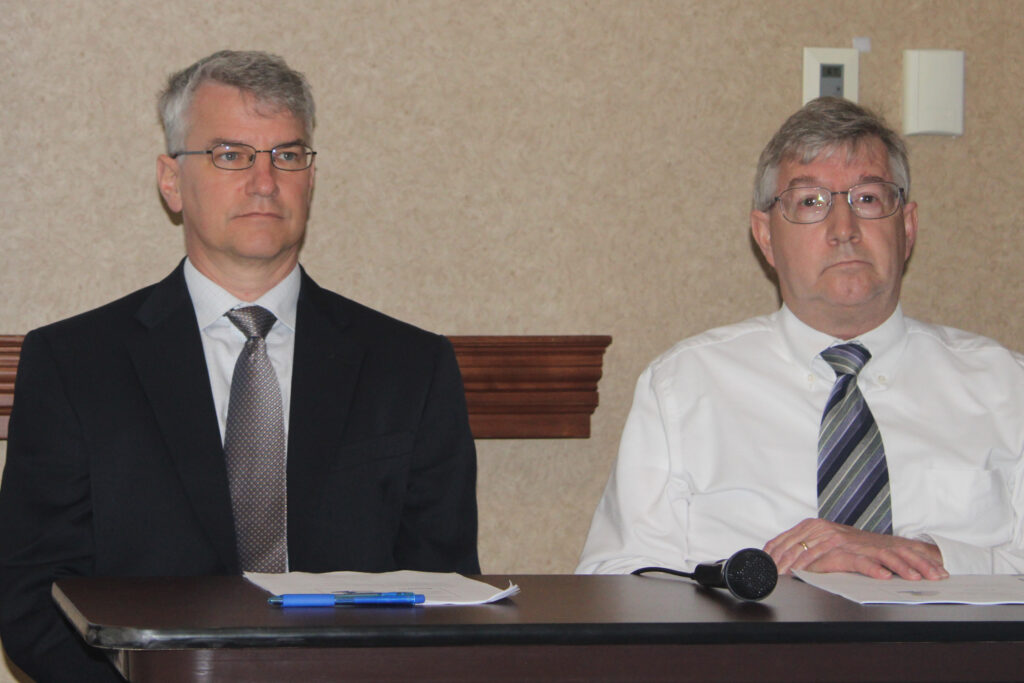
PRESQUE ISLE, Maine — With another electricity rate increase looming on July 1, Aroostook County residents asked Versant Power leaders Monday when the hikes will stop.
About 23 people attended the power company’s annual open customer meeting and rate update in Presque Isle.
Northern Maine consumers’ bills decreased in January, but that relief was short-lived. Increasing stranded costs from solar project subsidies are the major cost drivers of the coming rate increases, along with support of Efficiency Maine, according to utility officials. Average residential customers will see their electric bills rise by about $7 next month.
“One of the reasons I’m here, and I think I can mirror a lot of the concerns of the ratepayers here in Aroostook County — last year, my bills were running $17,000, $18,000 a month, and in one month, they went up to $32,000,” said radio station operator Allan Wiener of Monticello. “The rates are killing small business.”
The complexities of billing are difficult for the average ratepayer to understand, which adds to the frustration, he said.
Utility bills contain two parts: electricity supply, for which most residences use the standard offer rate, and transmission and delivery, which Versant provides.
Current rates for Aroostook customers are, per kilowatt hour, 11.3 cents for supply and 13.6 cents for transmission and delivery, totaling 24.9 cents per kilowatt hour, according to the Maine Public Utilities Commission.
Some Central Maine Power customers across Maine will see increases, while those in Versant Power’s Bangor Hydro District will see lower bills.

Stranded costs and conservation are also part of Versant’s charges. Stranded costs include state program costs and buying of long-term power, and conservation costs support Efficiency Maine programs, according to the utility.
Higher costs are also due to state programs passed by the Legislature and MPUC to expand alternative energy — including net energy billing, which gives credits to solar power buyers, said Judy Long, senior manager of communication and brand.
“The intended goals of this policy are to create more local energy support, local jobs, help some of the municipalities that want to supply their own power,” she said. “But we are seeing that the costs are bringing into question if this policy is working best for us and may require further adjustments.”
People are struggling with finances and have to prioritize what they can afford, said Sue Bernard of Caribou.
“I think everybody in this room is on the same page for taking a really close look at how we’re going to spread out energy costs and what are the best ways. And is solar the best way?”
The state program also includes other energy sources, like hydroelectric power, Long said.
Versant has experienced a 59 percent increase in stranded costs, said Stephen Johnston, director of rates and revenues for the utility.
Though transmission costs are actually going down slightly, other charges are rising. Each customer will see a different impact, but a typical bill for a residence using 500 kilowatt hours a month will be $132, he said.
Several speakers pushed for explanations of the rising costs, citing effects on consumers and businesses.
One speaker said he did not blame Versant for the increases, but asked what the Governor’s Energy Office was doing to help Mainers afford electricity. An energy office representative did not address questions during the public session.
“We have a lot of resources that can go across the border at any time, and the reason they go across the border is because they can be manufacturing products a lot more cheaply than they can in northern Maine,” said the man, who did not identify himself. “We have got to be competitive, and the one common thread that hits everybody’s pockets is energy costs.”
Versant intends to blend some of its rate classes to make rates more stable, and will also offer options for businesses using electric vehicles and energy storage, officials said.
The story has been amended to correct the elements of stranded costs and Bangor Hydro District decreases.







